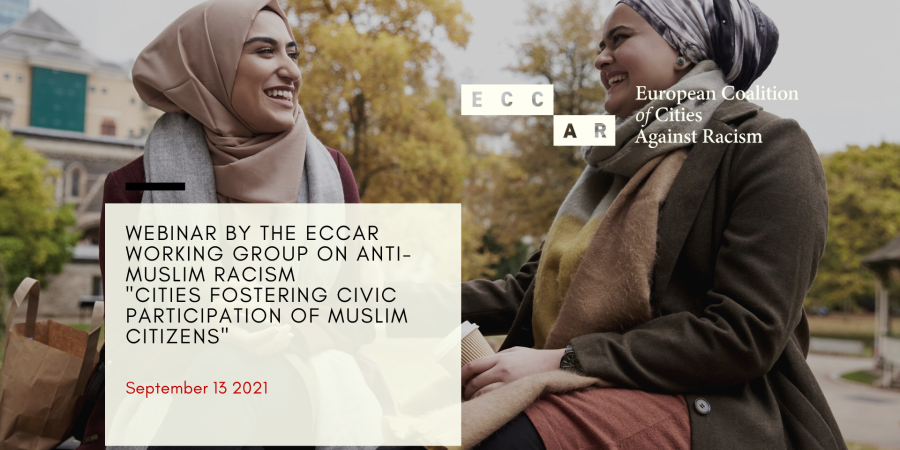
On the occasion of the annual European Day Against Islamophobia (September 21st), ECCAR’s working group on anti-Muslim racism organized a webinar entitled “Cities fostering civic participation of Muslim citizens” on September 13th. ECCAR member cities and their local partners all around Europe participated in this knowledge-sharing event. A poll amongst the cities showed a need for more robust facilitation of political activism and socio-cultural events open for the public and initiated by the Muslim communities.
The two invited experts who spoke at the event also addressed these topics. Dr. Amina Easat-Daas (De Montfort University, UK) noted the importance of recognizing Muslim residents’ intersectional identities while fostering civic participation. She emphasized that positive and inclusive local identities - formed around cities and communes - have significant potential in the current politically tense atmosphere. While the far-right is monopolizing the narratives about national identities in exclusionary and ethnically loaded terms, identification with the city of residence is oftentimes easier and more familiar to many members of minority groups. Yasemin Soylu, Deputy Managing Director of “Muslim Academy Heidelberg” in Germany, highlighted in her turn how bottom-up initiatives in civic participation could challenge the prominent narratives about Muslims as “the Others” in the societies. She encouraged the cities in facilitating Muslims’ visibility as “an inherent part of the society” and as citizens who may use their religious beliefs as a resource for fostering democracy.
As part of a pan-European anti-racist coalition, ECCAR member cities play a significant role in building inclusive cities, leading to an inclusive Europe. In the city and the public space in general, experiences shape the sense of safety and belonging to a specific environment. Dr. Amina Easat-Daas brought forth the importance of recognizing Muslim civic participation as an asset in achieving mutual benefits among residents of different backgrounds. In other words, Muslim citizens’ interests should not be defined only by their faith identity but also by many other social identities they carry as residents, parents, students, neighbors, professionals. Many European cities lack Muslim representation in the civil society sector. Followingly, “Muslim life” is often recognized as being located only in the city’s peripheries, such as industrial areas where mosques and prayer rooms usually are based, as Ms. Yasemin Soylu noted in her presentation. The webinar participants were committed to changing this by strengthening the networking between the city administration and local Muslim communities and facilitating the visibility of Muslim actors in their societies.
The working group on Anti-Muslim racism is currently working on collecting good practices tackling anti-Muslim racism on the local level. The Muslim Academy Heidelberg is an excellent example of an initiative that follows a bottom-up process and addresses questions of citizenry related to both Muslim and non-Muslim residents. Thus, the project empowers Muslims as a target group and fortifies intergroup exchange and cooperation.
ECCAR’s working group will organize its next webinar in October on monitoring and recording hate crime and discrimination.
